Our Writing Subject Leader
Mrs Dove
Intent
It is our intent at St Joseph’s Catholic Primary School to provide all of our children with a high-quality education in English, which develops a genuine love of reading, writing and discussion. It is our intention to ensure that, by the end of their primary education, children have the required knowledge and skills that allow them to speak, read and write fluently so that they can confidently communicate their ideas, view points and emotions to others. We believe that this will give our children the tools they need to succeed in life.
.png)
By the time our pupils leave St. Joseph’s, we want them to be able to:
- Write with purpose, understanding the purpose and audience of a piece of writing.
- Use imaginative description, developing an appreciation of how best to convey ideas through description.
- Organise writing appropriately, developing an appreciation of how best to convey ideas through description.
- Use paragraphs, understanding how to group ideas to guide the reader.
- Use sentences appropriately, using different types of sentences appropriately for both clarity and for effect.
- Present neatly, understanding the importance of handwriting and clear presentation.
- Spell correctly, understanding the need for accuracy.
- Punctuate accurately, understanding that punctuation adds clarity to writing.
- Analyse writing, understanding how grammatical choices give effect and meaning to writing.
- Present writing, learning to reflect upon writing and reading it aloud to others.
Implementation
At St Joseph’s, writing is taught through carefully sequenced lessons within each unit of work. These lessons revisit and build upon prior learning in grammar, punctuation, and spelling to ensure strong progression. Each year group follows a yearly overview that covers a wide range of genres, enabling children to write for different purposes and audiences.

Lesson Pedagogy:
At St Joseph’s, our writing lessons follow a signature, evidence-informed approach that includes modelling, guided practice, and independent application. This structure supports pupils in gradually developing the skills and knowledge they need to succeed as confident writers.
Each lesson follows a carefully designed sequence that moves from explicit teaching to independent writing, with opportunities to rehearse, refine, and embed learning. This approach reduces cognitive load by breaking learning into repeated, manageable steps. It ensures pupils are not expected to apply new knowledge prematurely, which increases both confidence and accuracy.

Lessons in Key Stage 1 may vary from the above structure. Teachers use their judgement if their class are ready for the above pedagogy.
- Handwriting and Letter Formation - Lessons begin with handwriting practice, following our agreed sequence of letter formation. Pupils complete this as a class activity; however, those requiring more targeted support work closely with an adult.
- Spelling - The next part of the lesson focuses on spelling, using the Sounds-Write approach.
- New Learning - The main learning objective for the lesson is introduced, and key vocabulary is shared with the pupils.
- Recall - This section uses the I do, we do, you do approach to reinforce the basic skill of the lesson. For example, if the focus is on sentence construction using expanded noun phrases, this part will concentrate on identifying adjectives.
- Skills & Concepts - The I do, we do, you do approach is repeated, with increased challenge. Activities may include constructing sentences with expanded noun phrases, up-levelling teacher-provided sentences, and using sentence stems.
- Skills in Practice - The I do, we do, you do process is applied once more, with pupils now using their learning to write a full paragraph.
- Reflection - Pupils reflect on the key learning from the lesson and share their successes. The teacher guides them in assessing their understanding and evaluating whether they have met the learning objective and if any edits need making to improve their work.
- Next - The lesson concludes with a short pre-teaching session that introduces the topic for the next lesson, helping pupils prepare and build anticipation for future learning and understand the purpose of the current lesson.
Sequence of Lessons:
At St Joseph’s, we want our children to develop a thorough and secure understanding of how to write effectively, with a clear sense of purpose and audience. To achieve this, writing is taught progressively and purposefully, through carefully planned sequences that build knowledge and skills over time.
Each writing unit begins with teachers selecting a high-quality novel or text, alongside a specific genre that pupils will work towards. Teachers then plan a structured sequence of lessons designed to immerse children in the text, explore the features of the genre, and build towards an extended piece of writing. Throughout the unit, children are given regular opportunities to apply their learning through short, focused writing tasks, helping them to practise and refine their skills.
We help children understand their strengths and areas for development in writing, encouraging them to take ownership of their progress. Teachers use our marking framework to share clear next steps, so pupils know exactly what they need to do to improve. Where needed, appropriate scaffolds are provided to support learners.

English Careers at St. Joseph's
Part of our mission is to prepare our children to achieve well and to inspire them to dream big. We want our pupils to understand the purpose of their learning and to make meaningful links between the skills they develop and how these will help them in the world of work.
Careers connected to English are discussed during lessons. In addition, at the start of certain lessons, teachers may share ‘Why Bother’ videos from My Path, which explicitly outline how the content of the lesson relates to future careers and the world of work. This helps to give their learning clear purpose and relevance.
Professional Development
As a school, we continually seek out ways to improve our teaching of English by taking part in regular professional development, such as working with the English Hub, and implementing evidence based research, such as Education Endowment Foundation.
Our Reading Lead
Mrs Gray
Intent
At our school, we intend to create an environment where reading is not only encouraged but celebrated. A place where children are read to regularly, fostering a love of literature and enhancing their comprehension skills using high-quality texts tailored to ignite curiosity, promote discussion, and engage children.

Implementation
- Reading is taught through a structured, systematic approach beginning with high-quality phonics instruction, starting in the Early Years using the Sounds Write programme. To find out more about Phonics at St Joseph's, click here - Phonics | St. Joseph's Catholic Primary School
- Group reading, whole class reading and one to one reading is used to meet the needs and abilities of all pupils.
- To support the development of fluency, prosody and comprehension skills, children participate in group reading sessions weekly. Pupils in KS1 read with an adult at least three times during their group reading sessions. In KS2, each group will be lead by an adult twice. Sessions also include a comprehension focus, which includes the use of Accelerated Reader, and a Reading for Pleasure session.
- Every class has ‘story time’ at least once a day, where the teacher takes the opportunity to models reading
- Our approach to writing is text/novel based.
- Throughout their education, children are exposed to a diverse range of genres, texts and authors to deepen comprehension and develop a genuine love of reading – Texts are woven throughout the curriculum
- Reading for Pleasure is promoted using class libraries, our school library, our reading shed, visiting our local library, author visits, celebrating World Book Day and providing children opportunities to read quietly.

Our Reading Offer
Universal Offer
High-quality, inclusive teaching that benefits all pupils
- Sounds Write phonics from EYFS to Year 6 – Daily for EYFS and KS1, three times per week for KS2.
- Four group reading sessions per week – Adult led at least twice per week
- One to one reading for all at least once per week
- Whole class reading daily – Story Time
- Text/novel-based writing curriculum
- Progressive Reading Spines
- Accelerated Reading programme to ensure correct assessment of reading levels
Targeted
Additional support for pupils who are not making expected progress
- One to one reading at least three times per week, focusing on the skill identified on an individual basis
- Use of ‘Keep Up’ phonics intervention sessions, at least four times per week
- Reading Buddies – Peer mentoring
- Pre-teaching of vocabulary
- In class adaptations, scaffolds and support
Intensive
High personalized support for pupils with barriers to reading
- One to reading daily, focusing on the skill identified on an individual basis.
- Use of ‘Catch Up’ phonics intervention sessions, at least four times per week.
- Precision Reading intervention, at least four times per week.
- Access to Lexia
- Specialist involvement – SENCO, Educational Psychologist referral, Cognition and Learning team, Speech and Language etc.
- In class adaptations, scaffolds and support
Impact
Children leave St Joseph’s:
- Enjoying reading across a range of genres and have a positive attitude towards reading
- Have had made progress and succeeded in reading
- Well prepared for the next stage of their learning, having developing skills and habits needed to read independently, critically and for pleasure.
Pupil Voice
We love to gather the thoughts and opinions of our children. This helps us to refine and improve our practice. Here is a summary of results from our most recent survey:
.jpg)
.png)
Intent
At St. Joseph’s, we strongly believe that our pupils’ voices need nurturing and support to help them express themselves confidently and with ease. We aim to develop confident speakers who can articulate their thoughts and feelings clearly, enabling them to stand shoulder to shoulder with others throughout their lives.
Oracy is not treated as a stand-alone subject; rather, it is a vital tool embedded across the curriculum. It plays an integral role in teaching and learning, helping to prepare our pupils for the world around them and supporting their journey to becoming independent, articulate citizens.
Implementation
Oracy is woven into the fabric of our curriculum and daily routines. We use purposeful strategies and resources to promote both learning through talk and learning to talk, including:
- Progressive ‘How We Talk’ rules displayed in every classroom to guide expectations during discussions.
- Planned discussions in pairs, small groups, or whole-class settings, including "Think, Pair, Share" and goal-free problems in maths.
- Sentence stems to scaffold responses, e.g., “I disagree because…” or “Have you considered…?”
- Drama activities such as hot seating and role play.
- Debating and presenting opportunities.
- Choral reading to build fluency and confidence.
- Weekly British Values assemblies using Picture News to explore current events.
- Participation in Trust-wide events, such as Debate Mate.
- Staff modelling of high-quality oracy to provide consistent role models.
Teachers use probing questions, participation strategies, and prompts like sentence stems to deepen understanding.
Our progressive Talking Rules are displayed in classrooms and children are prompted to follow these rules throughout all aspects of the day.



Types of Talk
As children progress through school, they encounter a range of oracy challenges and opportunities that build on prior learning. These experiences are designed to develop confidence, self-esteem, and the ability to speak effectively in front of diverse audiences.
Pupils engage in a variety of talk types, including:
- Exploratory Talk - Working with a group, expressing what their opinion is, answering questions posed to them
- Recitation - Reciting individually or collectively information they know, reading aloud
- Debate and Persuasion - Sharing opinions for agreeing and disagreeing, holding debates.
- Informing and Teaching - Explaining a method to a group/the class
- Entertainment and Expression – Reading aloud with prosody during group reading sessions, role play or drama
We use Types of Talk rules during specific oracy opportunities.




We want our children to be confident speakers and to do this children are regularly given opportunities to speak in front of different audiences, including peers, the whole school, parents, parishioners, and governors.
Enriching Oracy Opportunities
We strive to provide our children with opportunities beyond the classroom. Here are some photos of our recent Shakespeare Workshop at Palace Green Library that provided our pupils with an opportunity to work collaboratively and perform on a stage whilst being directed by stage producers and with a sound and lighting crew!
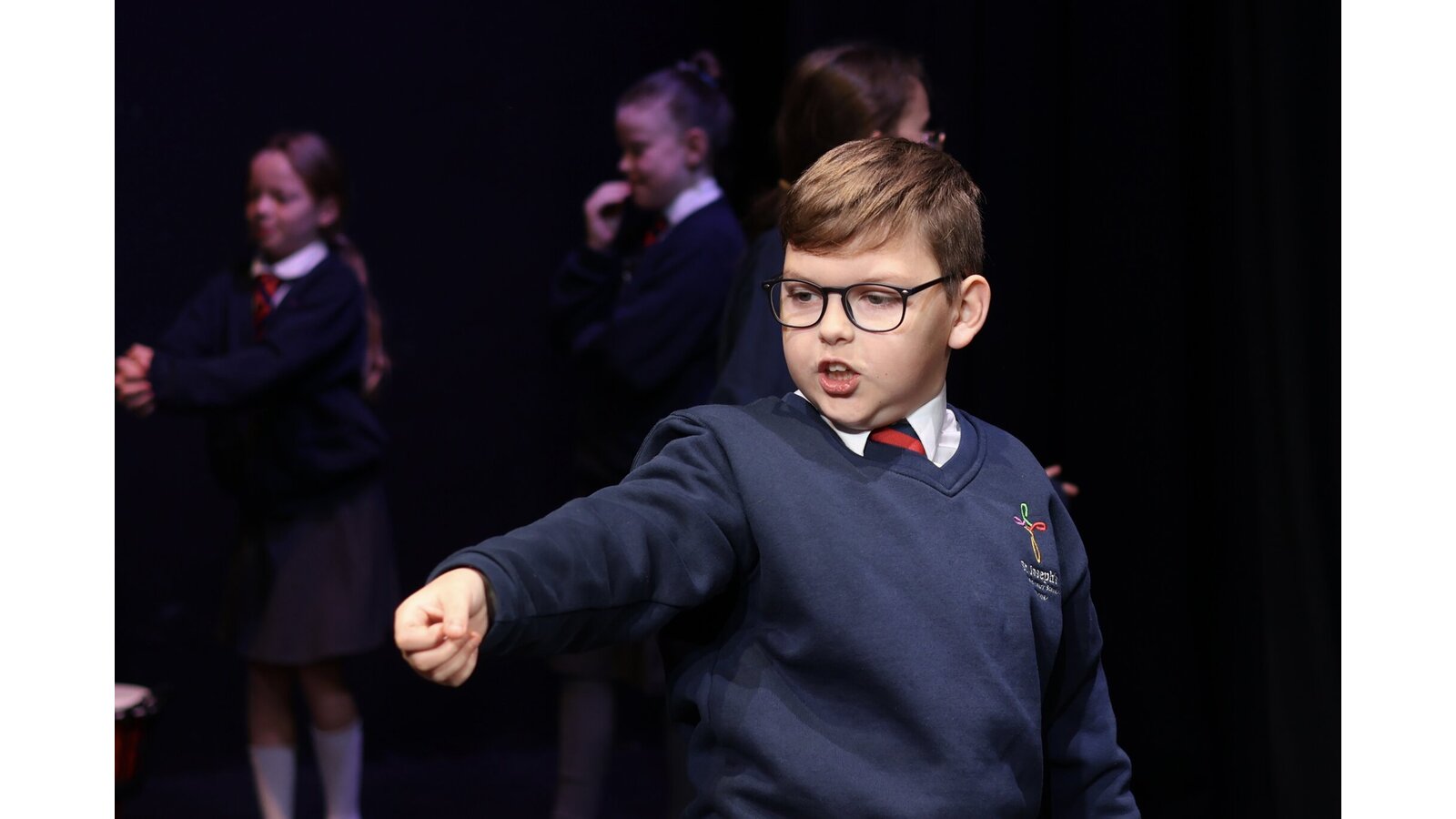
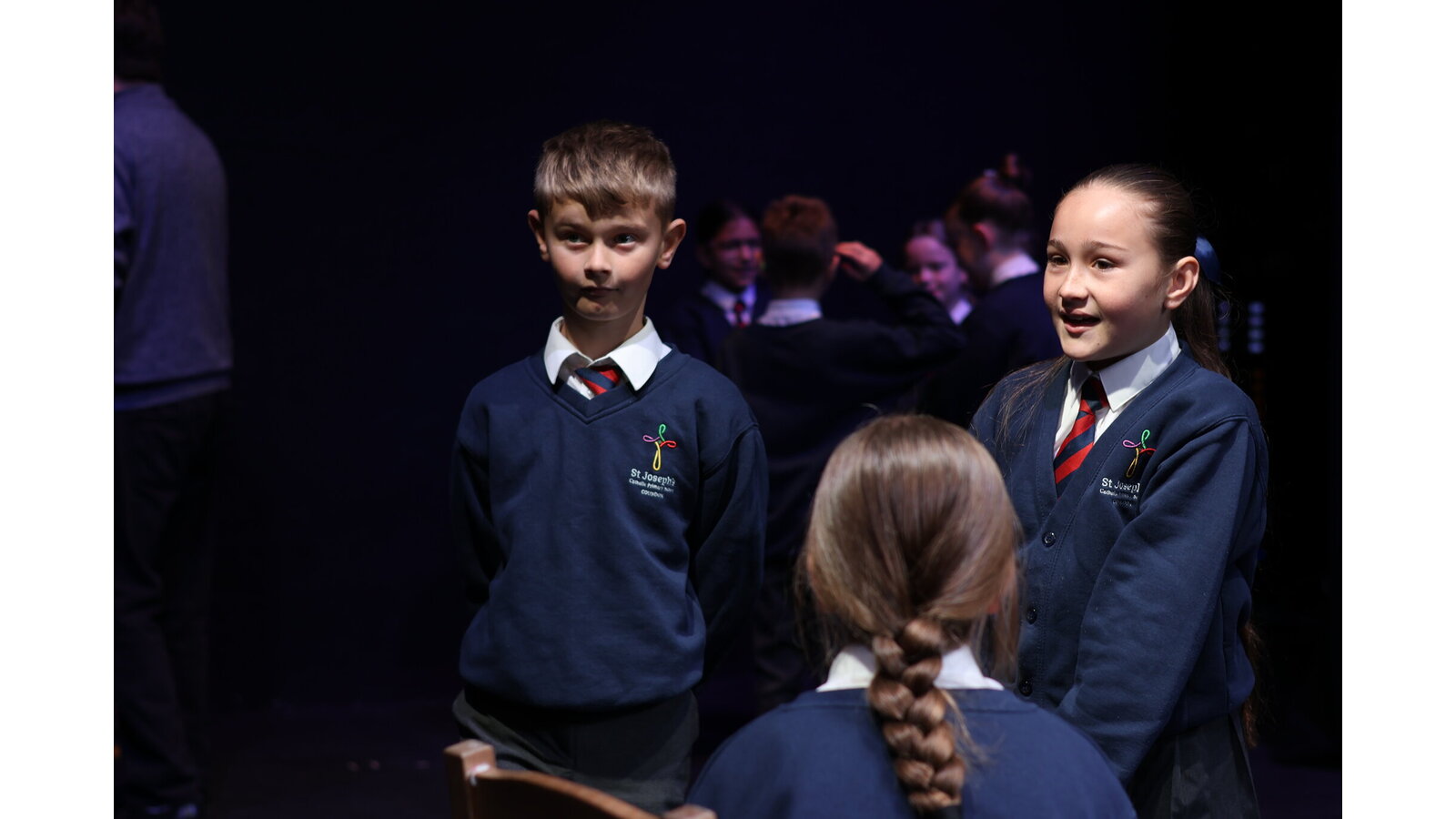
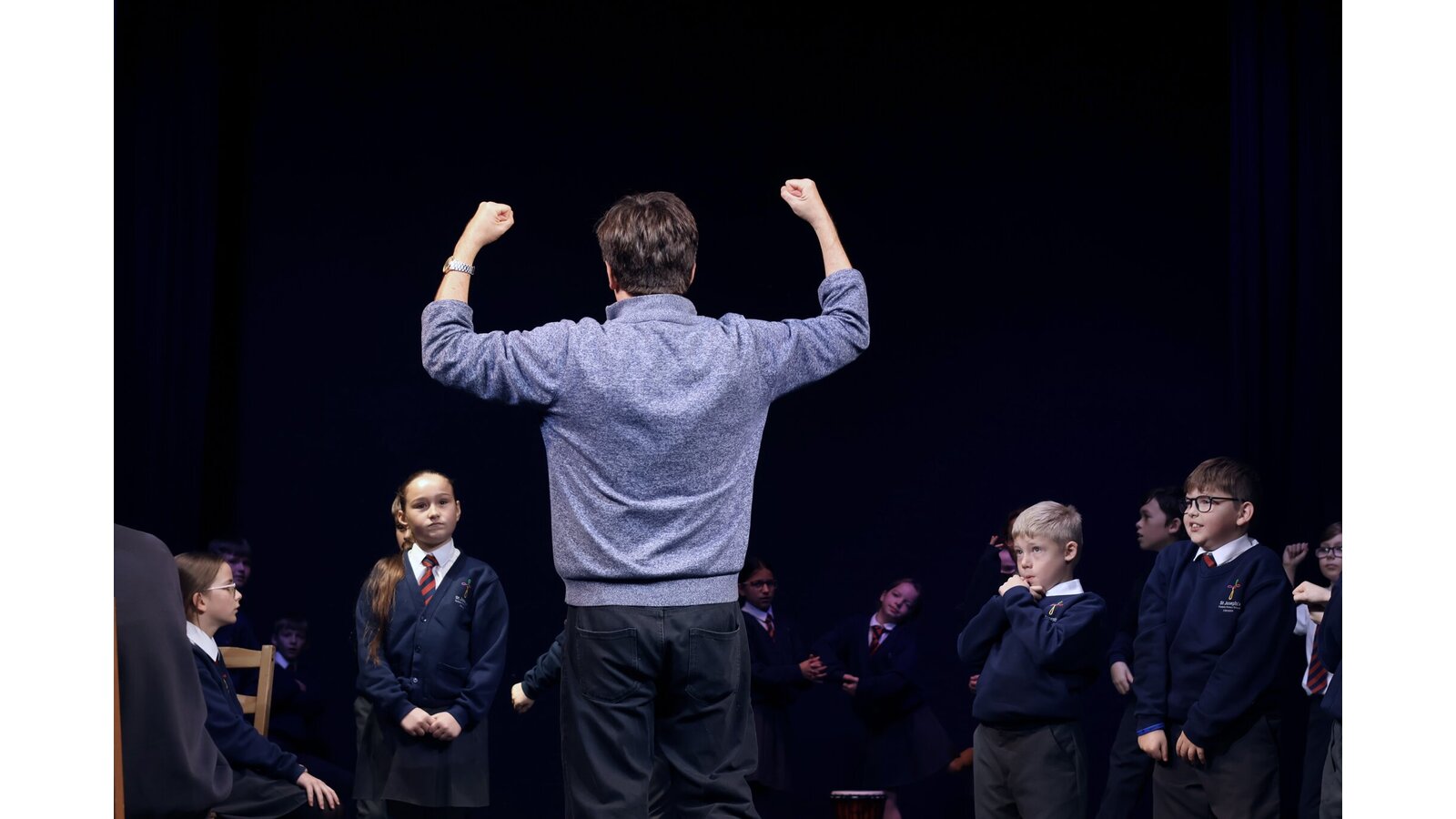
.jpg)
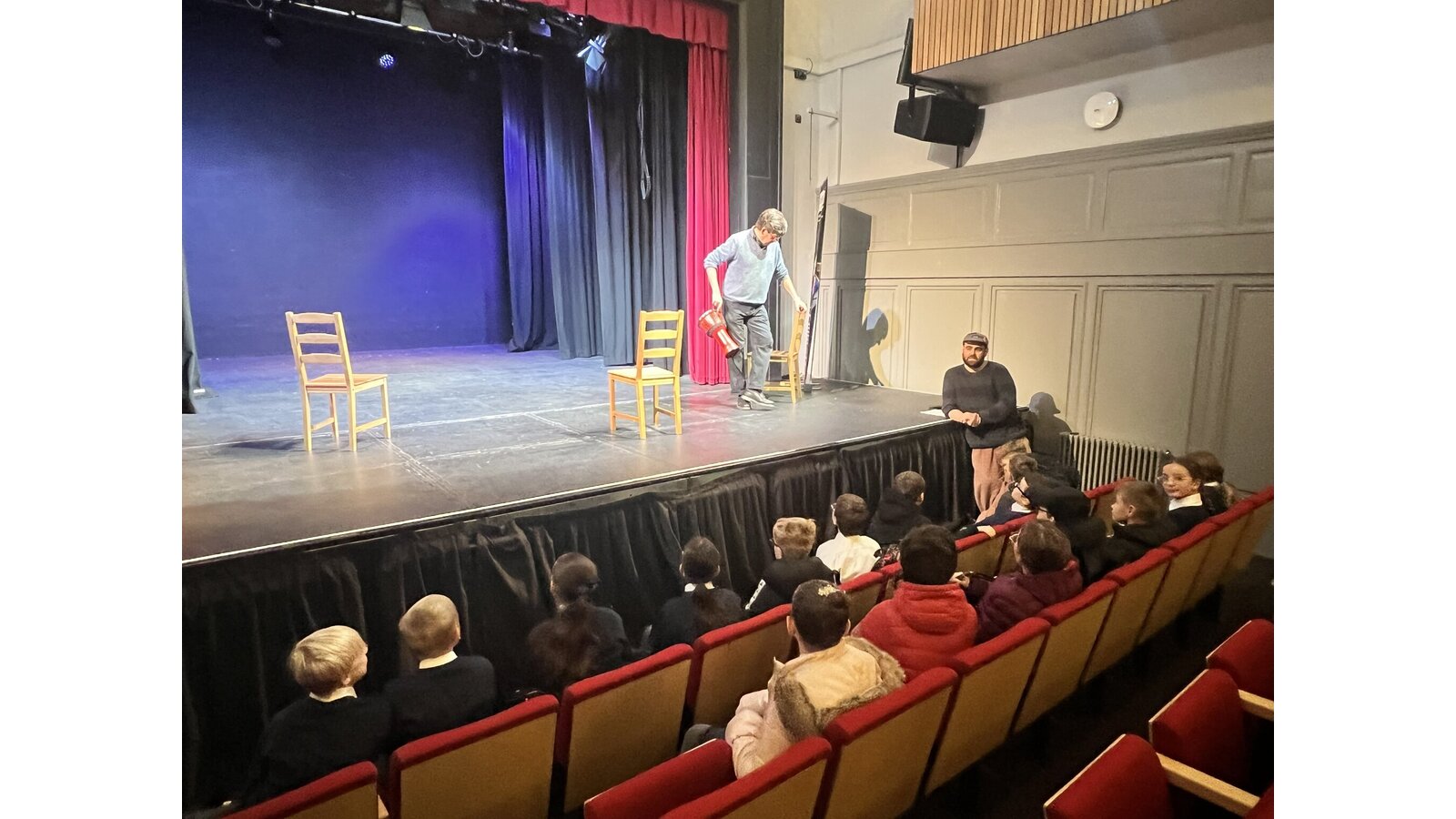
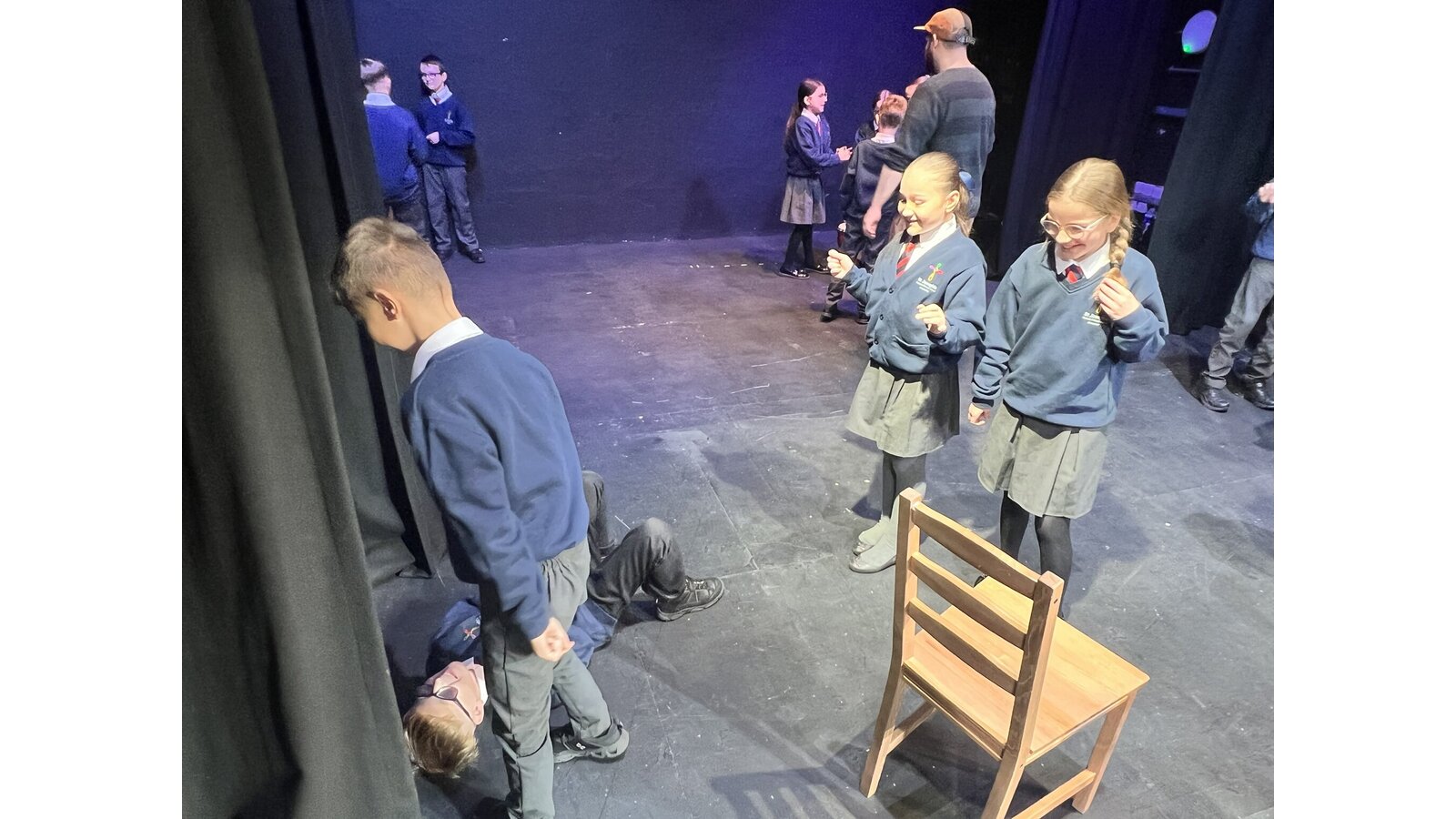
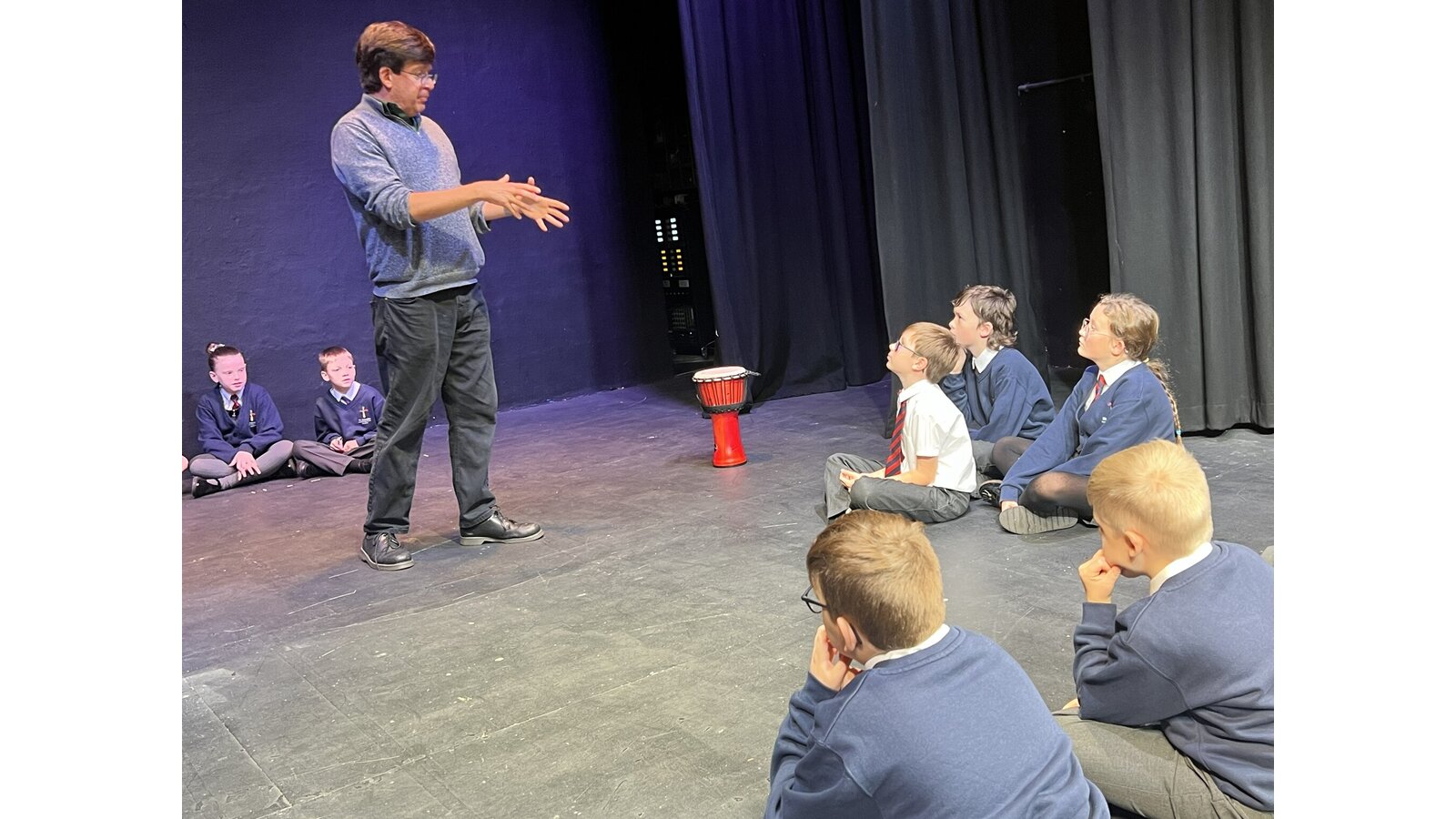
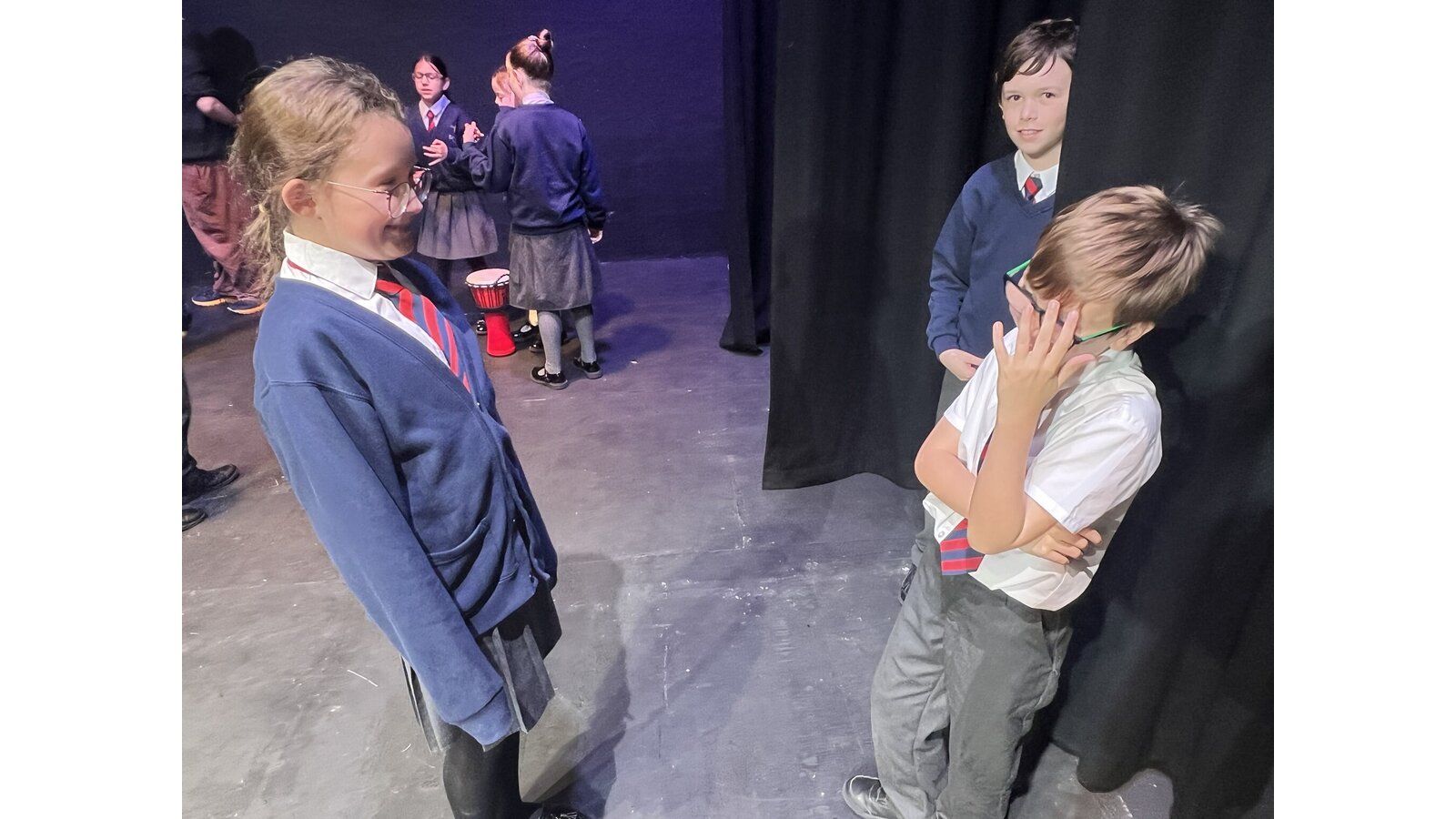
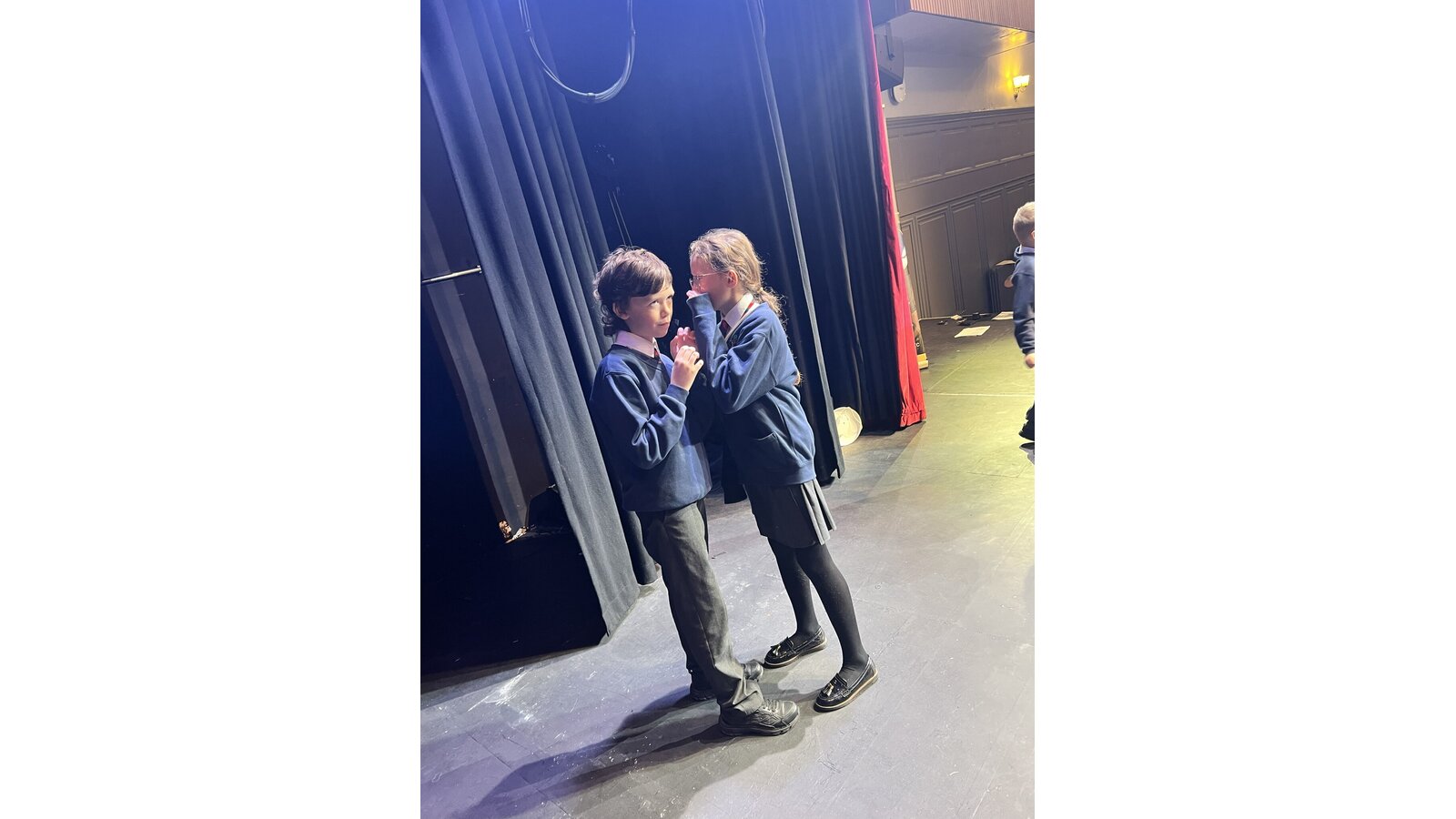
.jpg)